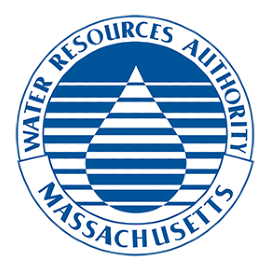Recently Completed Facilities
MWRA has recently constructed a new network of tanks to protect and store treated drinking water in compliance with the Federal Safe Drinking Water Act.
The tanks replace a 100-year old system of open reservoirs. Many of the original, open reservoirs are still maintained for emergency use.
Other Storage Tanks
- Arlington (1937) – 2 million gallons
- Bear Hill, Stoneham (1986) – 6 million gallons
- Bellevue, West Roxbury (1955) – 3.7 million gallons
- Deer Island, Boston (1994) – 2 million gallons
- Turkey Hill, Arlington (1945) – 2 million gallons
- Walnut Hill, Lexington (1961)– 2 million gallons
Protection
Covered tanks protect drinking water from potential contamination by natural sources, such as algae, bacteria, birds and other animals.
Storage
In total, MWRA's storage tanks hold approximately 180 million gallons of treated water. The water is continuously used and replenished.
Storing treated water at points across the water system keeps a supply of treated water available for communities' critical needs in the event of an emergency, such as a natural disaster or a major break in the transmission system.
Water Pressure
MWRA's service area ranges from the hills of Central Massachusetts to near sea-level communities on the East Coast. Our covered water storage tanks are located at key elevation points, helping to maintain appropriate pressure levels across the system.
Where the Water in the Tanks Comes From
MetroWest and Metro Boston Communties
Most MWRA communities receive their drinking water from the Wachusett Reservoir.
The raw water is treated at the John J. Carroll Water Treatment Plant in Marlborough, then sent eastward through the MetroWest Water Supply Tunnel to covered storage tanks at Norumbega, Loring Road, Blue Hills, Fells and Spot Pond.
From the tanks, water is then distributed to member communities. Each community maintains its own network of pipes that ends at customers' taps.
Chicopee Valley Area Communties
Drinking water for three Chicopee Valley communities (Chicopee, Wilbraham and South Hadley Fire District #1) comes from the pristine Quabbin Reservoir.
After leaving the reservoir, the raw water is treated at the Quabbin Water Treatment Plant, then stored at the Nash Hill storage tank in Ludlow.
From the Nash Hill tank, water is then distributed to communities. Each community maintains its own network of pipes that ends at customers' taps.
Water is tested at every step from the source to the tap.







